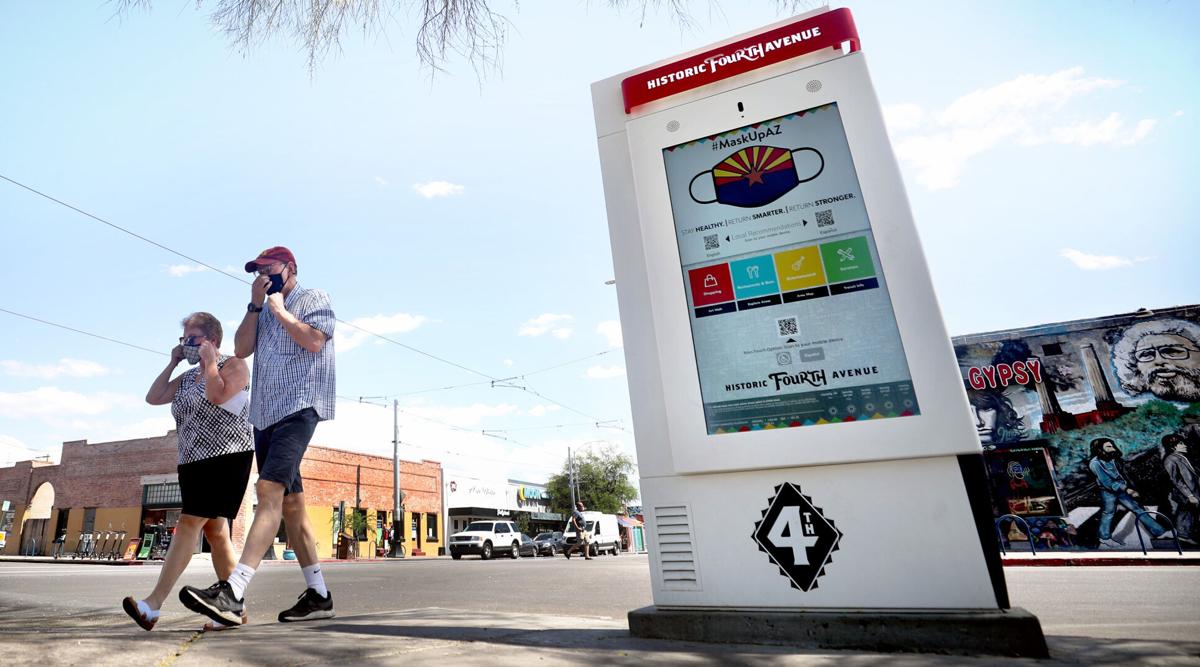The Pima County Board of Supervisors has started the process to potentially impose a vaccine requirement for county employees, but it rejected a motion to mandate masks in schools Tuesday as the board considered an array of COVID-19-related policies.
In August, the board turned down the same two proposals due to a slew of state laws banning local governments from taking such actions.
Those laws would have taken effect on Sept. 29, but a Maricopa County Superior Court judge struck them down in a Sept. 27 ruling, making the state laws unenforceable as the decision waits for review in the Arizona Supreme Court.
That change led Supervisor Matt Heinz, a staunch advocate of COVID-19 mitigation policies and physician at Tucson Medical Center, to bring the motions the board previously rejected back up for consideration.
Supervisors told County Administrator Chuck Huckelberry to outline potential policies for an employee vaccine mandate but again rejected a school mask mandate, favoring leaving the decision to local school boards instead.
Sheriff asks for more vaccine incentives
Heinz brought a motion before the board to direct Huckelberry to come up with a “workable COVID-19 vaccine mandate.” The recommended consequences for workers who remain unvaccinated included “reassignment to a nonpublic facing position, weekly or biweekly testing requirements, suspension without pay until vaccinated, or termination.”
The board voted 4-1 to approve the motion, directing Huckelberry to return Oct. 19 with his recommended policy for requiring vaccines. However, Supervisor Rex Scott made clear he would not support “any policy that calls for suspensions or terminations.”
As of Oct. 2, 4,823 active employees confirmed their vaccination status with the county — about 77% of the workforce. The Sheriff’s Department had the lowest vaccination rate at 52%.
Sheriff Chris Nanos told the board he is concerned about his department’s low vaccination levels, especially among corrections officers at the jail.
An inmate at the jail died after testing positive for COVID-19 on Sept. 25. Nanos said inmates must quarantine for 14 days upon arrival, but the corrections officer guarding over the deceased inmate tested positive for COVID-19.
“It’s pretty clear how this individual received COVID. Everybody in that jail cell is locked in,” he said. “I don’t have an answer for you, other than it’s my employees who are bringing that in.”
On Sept. 21, the supervisors approved a 5% raise for most county employees. To further encourage his employees to get vaccinated, the sheriff asked the board to withhold those raises from unvaccinated employees in the Sheriff’s Department. Huckelberry made the recommendation that condition be applied to all county employees.
The supervisors previously incentivized vaccines by offering $300 to all employees vaccinated by Oct. 1 while raising health insurance premiums for unvaccinated employees.
“Nobody wants our agency to get the pay that they deserve, the pay that makes them competitive with other agencies more so than I,” Nanos said. “But I also want them to be safe, I want them to be responsible for what it is they do for their jobs, their communities.”
The jail is short on staffing for corrections officers, Nanos added, expressing concern that a vaccine mandate would cause an exodus of employees and affect the jail’s operations.
The board denied the request to limit the 5% raises to vaccinated employees. Scott said he supported the board’s past actions to incentivize vaccinations but questioned the effectiveness limiting raises would have on increasing vaccination rates.
“To me, all of our employees deserve this 5% raise whether they are vaccinated or not,” Scott said. “I think when it comes to incentives and disincentives, we need to walk very, very fine line in terms of the things that are warranted, and the things that are just overly punitive.”
Mask decision left to school districts
Heinz also brought back a motion to implement a mask mandate at all county K-12 public and private schools after a similar proposal was shot down in August.
In addition to the state law being struck down, Heinz also pointed to a new CDC study co-authored by Pima County Health Department officials that found school districts without mask mandates were 3.5 times more likely to experience a COVID-19 outbreak.
The board rejected the motion in a 3-2 vote, with Heinz and Supervisor Adelita Grijalva voting yes.
Dr. Francisco Garcia, the county’s chief medical officer, told the board he’s spoken with 12 school superintendents across the county, and only two were supportive of a county-enforced mask mandate in schools.
“A big concern was that for the most part, they have figured out how to manage the political demands on their school board and how to manage and mitigate, even within that reality,” Garcia said. “To put it in the words of one of the superintendents, this just kicks the hornet’s nest.”
But Grijalva said those school districts without mask mandates “are begging us to help them,” while Heinz said those districts “are not doing their job to protect their children.”
WATCH NOW: University of Arizona graduate student Kelli Lycke speaks at a rally dubbed "a funeral for health and safety” on Thursday, Sept. 30, 2021 at the University of Arizona campus in Tucson. Video by Kathryn Palmer.





